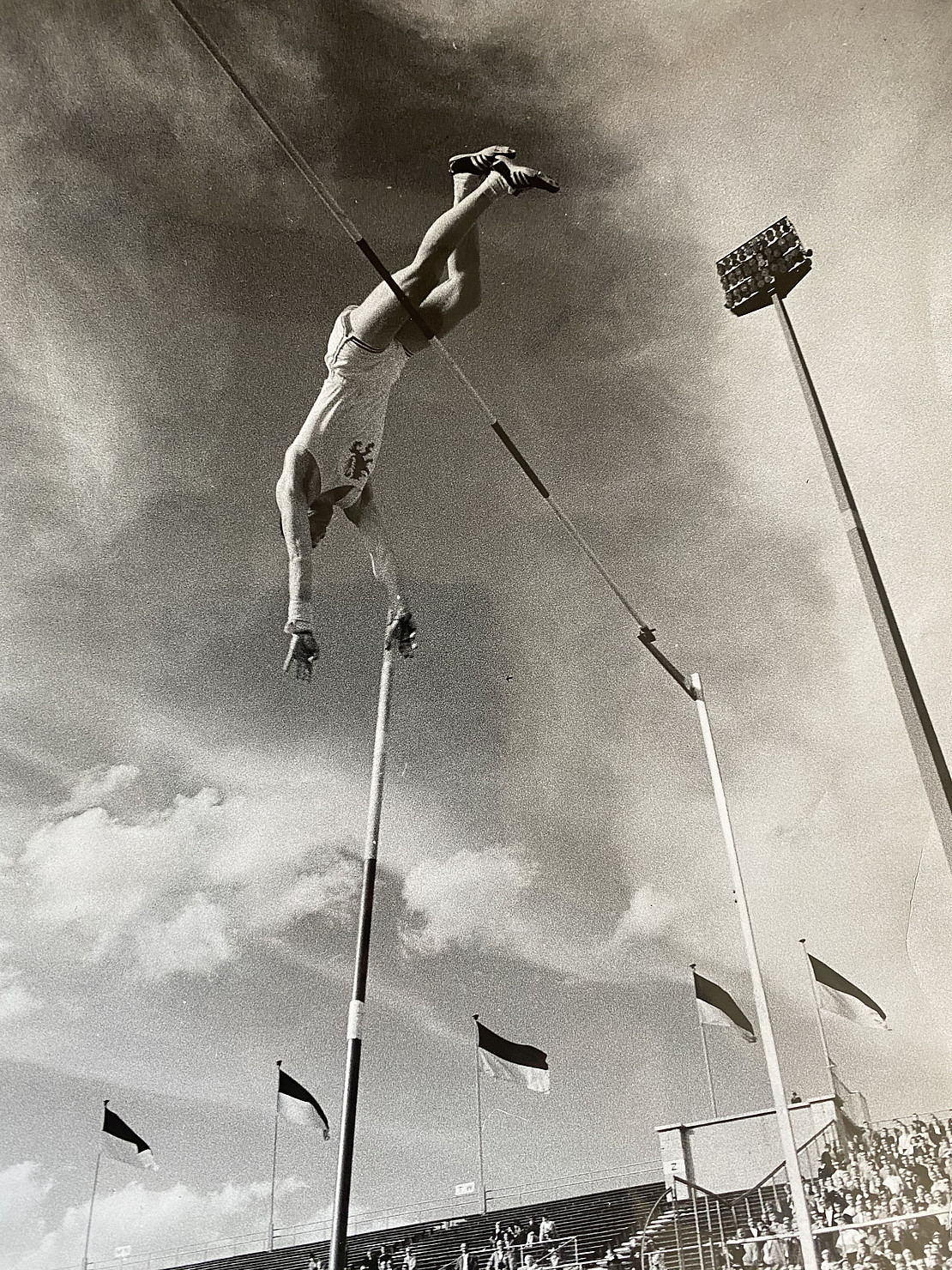This page contains automatically translated content.
A bronze medal for Kassel

It's been a long time since Klaus Lehnertz won the bronze medal in the pole vault at the 1964 Olympic Games in Tokyo, but he still remembers October 17, 1964, and the dramatic competition well: "The decision was only made after nine hours, shortly before midnight. To this day, he is happy about his success and the bronze medal: "When I clean it properly, it shines like gold..."
Before the competition, Lehnertz is not necessarily one of the medal candidates, his best performance until then is 4.85m. In addition, he also lacks the time for intensive training due to his professional obligations at the University of Göttingen. In retrospect, Lehnertz sees this as his great advantage: "This has allowed me to retain the joy of sport and competition." He shows strong nerves and also chooses the right competition tactics: while his competitors skip various heights, he skips every height from 4.40 m and thus stays in rhythm.
Shared joy
Klaus Lehnertz is joined at the start by two other German pole vaulters: Wolfgang Reinhardt from Leverkusen and Manfred Preußger from Leipzig. For a long time, these are the last Games in which an all-German team will compete. But the German division is also evident in the Olympic Village: there, the athletes from East and West are accommodated in separate quarters. "Private contact with us was forbidden to the GDR athletes," Lehnertz recounts. But he is good friends with Preußger, and the two support each other in competition and give each other tips. Lehnertz regrets all the more that he relegates Preußger to a thankless fourth place. Both jump over 5 m, but Lehnertz has one miss less. Reinhardt wins the silver medal with 5.05 m, the favored American Fred Hansen manages 5.10 m and becomes Olympic champion.
Klaus Lehnertz understands his success quite quickly and enjoys the atmosphere in the Olympic station in Tokyo. "It was an indescribable feeling. The following night I didn't sleep a wink," he recalls. Over the next few days, he still has the opportunity to get to know the country and its people, as he competes in sports festivals and competitions in various Japanese cities.
A warm welcome
The people of Kassel are also happy with Klaus Lehnertz, who is competing for KSV Hessen and bringing an Olympic medal to Kassel for the first time. They will give him an enthusiastic reception on his return on November 6. Thousands of spectators form a line at the main train station and on his way to the town hall, where he receives congratulations and the Golden Sports Plaque from the mayor of Kassel. Moved, Lehnertz expresses his gratitude: "Your enthusiasm shows me that you were happy with me, and this joy is the best reward for an athlete," the local newspaper quotes him as saying.
Lehnertz continues to compete and win national titles for a few more years, but he can't top the bronze medal. The Olympic Games in Mexico City in 1968 are quite unfortunate for him, as his vaulting poles are lost on the journey and he is eliminated already in the qualification. In 1969 he changed to coaching and coached the pole vault team of KSV Hessen until 1974. At the 1972 Olympic Games in Munich, he is briefly the national pole vault coach.
Professor at the GhK
His scientific career also becomes more important. After an apprenticeship in banking and training as a sports teacher, he teaches in Kassel from 1966, first at the Pädagogisches Fachinstitut and from 1971 at the GhK. In 1973 he became professor of sports science. He completes his doctorate in 1978 and his habilitation in 1985 with a thesis on muscle physiology. He teaches students technically difficult sports such as track and field, tennis and skiing, and also advocates for golf to be introduced at the university. "Most of all, I wanted to instill in my students the joy and motivation of sports." He has fond memories of the time, "We had unlimited freedom to do research. The university administration was very supportive of the sports institute." Lehnertz` research focus is on training and exercise theory. With the "Handbuch Trainingslehre," he co-edited a standard work that is still valid today. Even after retiring in 2003, he is not yet retiring, but continues to teach at the Golf Association.
After such a long association with the sport, however, he now takes a critical look at developments, especially at profiteering, commercialization and the doping problem in top-level sport. In his opinion, the 2021 Olympic Games in Tokyo should have been canceled because of the pandemic.
Golf and skiing keep fit
Today, Klaus Lehnertz enjoys his well-deserved retirement with his wife Gisela. The two have been married for 59 years. She has taken a lively interest in his career: "I've always supported him in training and picked up the baton, for example." Both have remained loyal to the Sports Institute: Until the Corona pandemic made travel impossible, they went skiing every year with sports students. At over 80 years of age, both are still very fit, to which the long walks certainly contribute: "Every afternoon there is a hike on the schedule, for example to Löwenburg Castle. And we also like to work in the garden," says Gisela Lehnertz. But above all, they are looking forward to the golf course reopening after the lockdown.
More from the history of Kassel University: www.50jahre-unikassel.de
TEXT Kathrin Meckbach